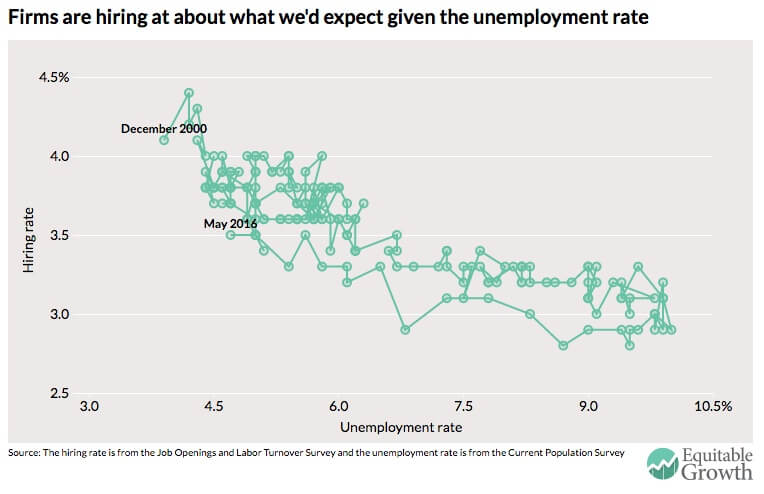Weekend reading: “Slipping on rungs of the income ladder” edition
This is a weekly post we publish on Fridays with links to articles that touch on economic inequality and growth. The first section is a round-up of what Equitable Growth published this week and the second is the work we’re highlighting from elsewhere. We won’t be the first to share these articles, but we hope by taking a look back at the whole week, we can put them in context.
Equitable Growth round-up
You’ve probably heard of concerns about “short-termism” among companies which prioritize hitting earnings targets over investing in research and development. A new paper details the phenomenon and its potential costs to U.S. productivity and economic growth.
Will the robots unleash amazing amounts of economic growth and throw us all out of our jobs? Well, it depends a lot on how increased mechanization of the economy affects labor demand.
The latest data from Job Openings and Labor Turnover Survey—known as JOLTS—was released on Tuesday morning. A look at a few important relationships between JOLTS data show any structural changes in the labor market seem more likely to be on the employer side.
An investment in a college degree lasts a lifetime, yet the time to repay student loans in the United States is usually only 10 years. Other countries allow a much longer time frame and there would likely be benefits to moving to such a system here.
“In general, a worker’s starting position has become more predictive of their final position across the income spectrum.” Austin Clemens shows with two interactive graphs how income mobility during a lifetime is on the decline in the US., according to new research by a pair of 2015 Equitable Growth grantees Michael D. Carr and Emily E. Wiemers at the University of Massachusetts-Boston.
Links from around the web
Does a universal basic income make sense in today’s economy? Greg Ip argues that in an era of declining labor force participation, an untargeted policy that would likely further depress the amount of workers in the labor force doesn’t make sense. [wsj]
“If countries want to carry international surpluses indefinitely the suggestion here is they need also to reinvest those “savings” into capacity expanding investments abroad. If not, those savings will eventually end up constraining global growth by turning everything into a simple zero sum game.” Izabella Kaminska writes on global imbalances. [ft alphaville]
Why some people so concerned about inflation? Noah Smith argues that fears of slightly higher inflation—say 4 percent annually—are overwrought and that central banks would shoot for higher inflation and boost real growth. [bloomberg view]
The decline of competition in the United States “is a decline that stunts entrepreneurship, hinders workers’ mobility and slows productivity growth.” And potentially, Eduardo Porter writes, decreased corporate competition could be a reason for high levels of inequality. [nyt]
Estimates of potential economic growth in the United States have been revised downward for years. But what’s behind these declines? J.W. Mason argues that a large chunk of these downward revisions are due to the continuing effects of the Great Recession. [slackwire]
Friday figure

Figure from “A graphical update on the latest data on the U.S. jobs market” by Nick Bunker

